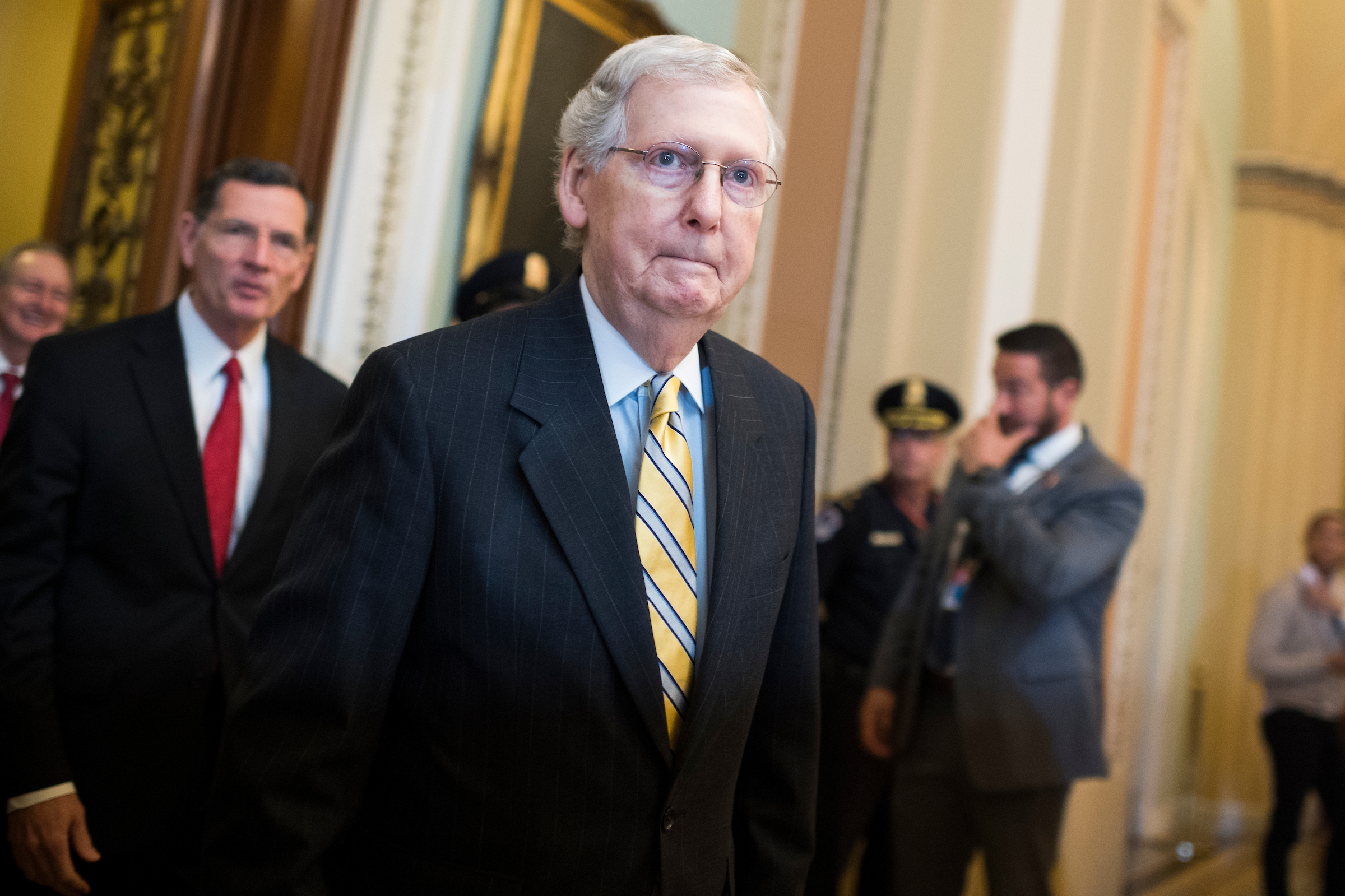McConnell introduces bill making the legal smoking age 21
“Youth vaping is a public health crisis,” Kentucky Republican says

Senate Majority Leader Mitch McConnell on Monday introduced a bill to raise the federal age for purchasing tobacco products, including e-cigarettes, to 21, increasing the chances that Congress will clear a significant smoking-related bill for the first time since a major tobacco control law was enacted a decade ago.
The bill comes amid growing concerns about the youth use of e-cigarettes, which reached record levels in 2018. That marked a troubling reversal of declines in smoking traditional cigarettes.
Those worrisome trends prompted McConnell to introduce the bill, despite the important role that tobacco farming plays in the economy of his home state Kentucky, he said in a Senate floor speech Monday.
“I recognize that I might seem like an unusual candidate to lead this charge,” he said. But he argued that Kentucky farmers had the same interest as anyone else in making sure their children don’t become addicted to nicotine. “Youth vaping is a public health crisis,” he said.
[FDA Plans Crackdown on Flavored E-Cigarettes]
The logic behind increasing the smoking age to 21 is that high school students are likely to know someone who is 18 who can legally purchase tobacco, but they are less likely to have friends who are 21.
The bill would make it illegal under federal law for retailers to sell tobacco products to anyone under age 21, and would essentially require states to enact their own laws raising the tobacco-purchasing age to 21 or risk not getting federal substance abuse grants starting in fiscal year 2021. A growing number of state legislatures have already been moving in this direction, with six state laws going into effect in July and two more in 2020 and 2021, bringing the total to 14.
“Raising the tobacco age to 21 is a critical part of our efforts to improve public health and keep tobacco products out of schools and away from our children,” the bill’s co-sponsor, Democrat Tim Kaine of Virginia, said in a statement.
[High school e-cigarette use is exploding and reversing prevention gains]
Tobacco-giant Altria, which makes Marlboro cigarettes, and the company that makes the popular e-cigarette JUUL both support raising the age to 21. The four-page bill does not contain provisions that help advance other aspects of the tobacco industry’s agenda, though.
McConnell’s home-state, Kentucky, grows more tobacco than any state other than North Carolina — though McConnell acknowledged in his floor speech that it has represented a shrinking proportion of the state’s agricultural output over time, especially after McConnell helped secure $10 billion in a 2004 law to help transition farmers to other commodities.
Kaine also hails from a tobacco-growing state, which includes the headquarters of Altria.
Both lawmakers are beneficiaries of tobacco industry campaign contributions, though in both cases the industry contributions amount to less than 1 percent of total campaign cash. Since 1990, McConnell has accepted $640,075, according to the Center for Responsive Politics. Kaine has accepted $113,514 since he ran for Senate in 2012.
In April, when McConnell said he planned to introduce the bill, he said it would exempt members of the military. But the bill as introduced backtracks from that plan and would apply to military members as well.
While public health groups were concerned that a bill from a tobacco-state lawmaker might include provisions meant to appease the tobacco industry, the bill does not prevent states from instituting their own tobacco policies, such as an even higher minimum age, that would be stricter than federal law.
“Some of the tobacco industry’s largest companies have supported tobacco 21 policies at the federal and state levels, either to score a public relations win or weaken efforts to pass more restrictive policies,” American Heart Association CEO Nancy Brown said in a statement commending McConnell and Kaine for their bill. “Make no mistake – the tobacco industry continues to target youth and adolescents with marketing gimmicks and flavorings that are intended to addict a new generation of users.”
With the introduction of a bill that only address the age requirement, the biggest challenge now might be dealing with calls for stricter regulation of e-cigarettes. House Democrats and a bipartisan group of Senate members, including Kaine, have called for tighter restrictions on e-cigarette flavors.
While the Food and Drug Administration was given the authority to regulate tobacco products in 2009, and is supposed to require new products to go through an authorization process before going on sale, many members of Congress are growing frustrated that e-cigarettes continue to be on sale without any kind of review.
The Trump administration had been planning to require those reviews starting in 2021 and 2022, but a federal judge last week said that those requirements would likely have to go into effect along a faster timeline.





